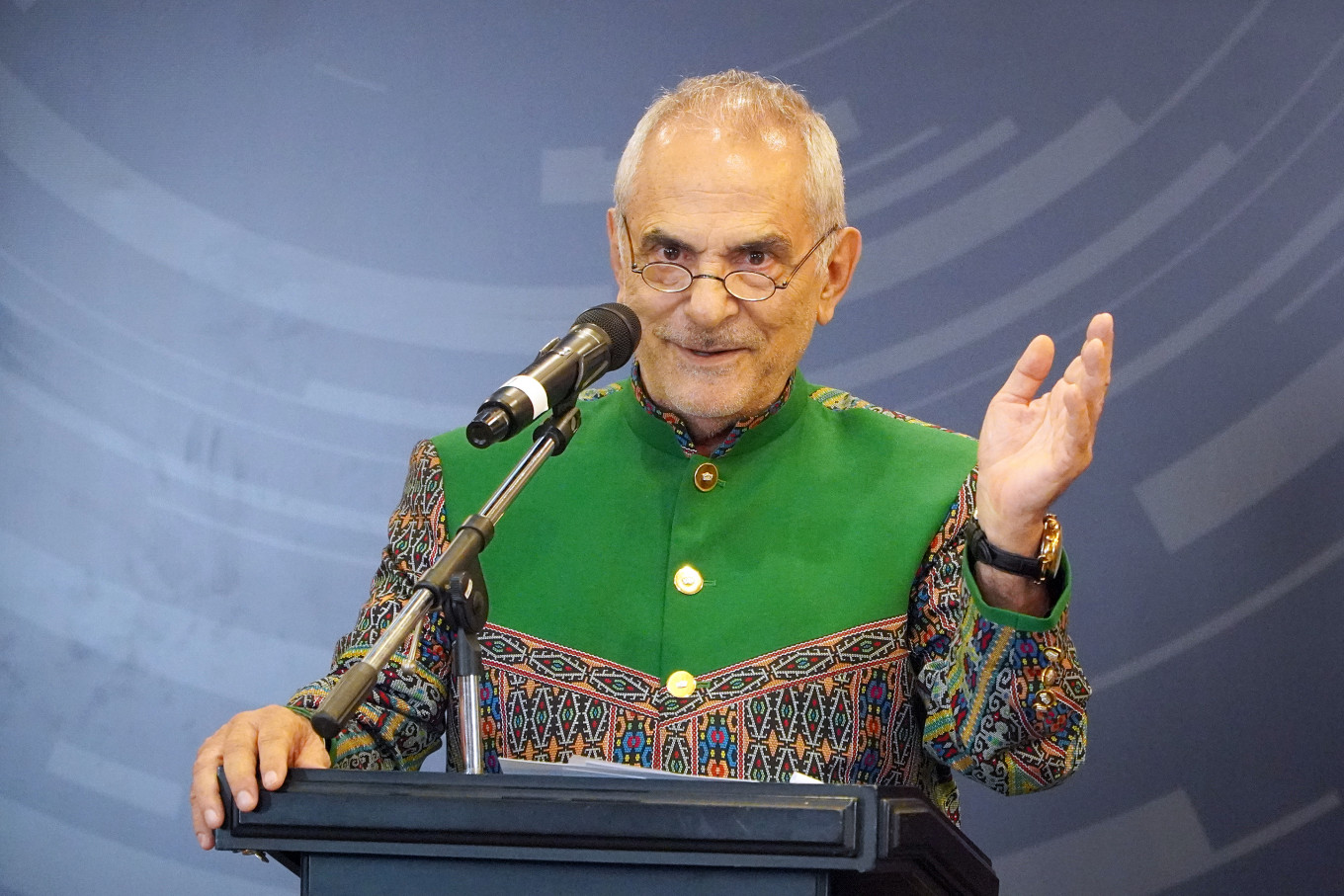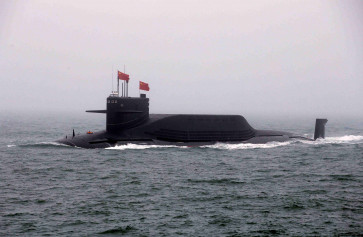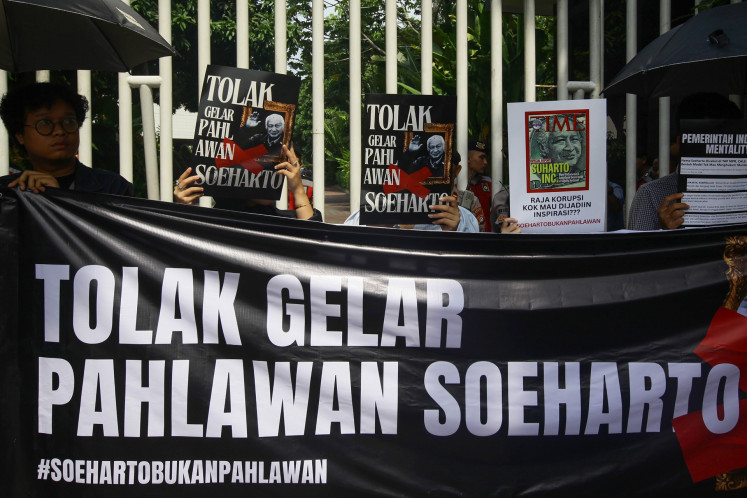Popular Reads
Top Results
Can't find what you're looking for?
View all search resultsPopular Reads
Top Results
Can't find what you're looking for?
View all search resultsLeadership, peace more important than ‘perfect’ democracy
When leaders do not manipulate people’s sentiments and emotions, there will not be any hatred.
Change text size
Gift Premium Articles
to Anyone
A
mid intense geopolitical rivalry and widespread democratic backsliding, Timor-Leste has defied the odds by becoming the most democratic country in the region while also maintaining neutrality. It has also maintained a strong relationship with Indonesia despite being a former colony. On the sidelines of The Jakarta Post’s Democracy Dialogue event on Monday, Timor-Leste President and Nobel Peace laureate José Ramos-Horta sat with Tenggara Strategics’ Philips J Vermonte and the Post’s Yvette Tanamal to discuss Dili-Jakarta relations, democracy and leadership. The following are excerpts from the interview.
Question: What is your perception of Indonesia given what happened in our past? How do you inspire the Timor-Leste people to not hate Indonesia?
Answer: My familiarity and relations with Indonesia goes back a long time. In the late 1960s, I read and saw movies about Sukarno and Indonesia’s struggle for independence. During Portuguese rule, I learned about diplomacy and politics from the former Indonesian consul in Dili, Elias Tomodok, whom I visited often. He was very political; he did not like at all the Portuguese colonial rule but was friendly with the Portuguese governor at public events.
At the beginning of the struggle, there was a great leader, Nicolau dos Reis Lobato, who I grew up with in a Catholic mission school. He was extraordinarily intelligent and a humane individual. From day one, he would always say: We are not fighting the Portuguese people, we are not fighting the Indonesian people. We are fighting for independence.
Years later came Xanana Gusmão with the same policy. In speeches, press or political writings, there was never any demonizing of Indonesia or other countries. We never used religion, ethnicity or terror, which is a strategy often used to provoke anger and mobilization.
In 1976, when I was lobbying in Washington, there was a congressman called Frank Wolf from Virginia who was a conservative Republican. He initiated a bill to impose mandatory sanctions against any country persecuting Christians, which a friend of mine suggested I take advantage of. My answer was, no; that’s not correct.
The problem in Timor-Leste was not Muslims vs. Christians. Many of the [Indonesian] generals involved in the invasion were actually Catholics or Protestants; I made a joke that in Indonesia, violence is non-discriminatory.
When Xanana was detained in a Cipinang prison in Jakarta, he sometimes joked that he was attending the “University of Cipinang”, because there he learned more about the Indonesian people and came to love them.
When leaders do not manipulate people’s sentiments and emotions, there will not be any hatred.
Timor-Leste is dubbed the best democracy in Southeast Asia. How would you assess the quality of democracy in the region now?
It’s very difficult to make any simple or generalized answer about that. I consider Indonesia to have a very dynamic, functional democracy. We can call it imperfect; but that would also apply to the United States democracy, or the Indian democracy. Even with Timor-Leste, despite our high ranking, I should say that ours is an imperfect one.
Democracy is something that requires attentiveness and a continuous building on. Gradually, and slowly, it will be consolidated, but never truly definitive. You can see this in the US, or Brazil. In the US, many Americans still want another four years of Donald Trump. That’s democracy.
I’m not naive or excessively romantic about democracy to make a judgment. I have great admiration for some countries that are not academically or theoretically defined as democracies, but are prosperous, peaceful and with relative freedom for their people to enjoy.
For example, the monarchies in the Middle East, or the governments in Jordan, Morocco, the Gulf countries like [the United Arab] Emirates, Qatar. In a very difficult region of the world, they have maintained incredible prosperity and peace. Are they defined as democracies? I don’t know. But I don’t care about it that much.
Dili is applying to ASEAN, which now has to walk a thin line amid the geopolitical tensions between the US and China. How does Timor-Leste position itself?
All these years, we have developed a great relationship with everyone, including our immediate neighbors, Indonesia, [which] is number one, then Australia; then others like Singapore, Malaysia; and beyond like Thailand, the Philippines, Vietnam, Cambodia, et cetera.
We also have a great relationship with the US and China despite [their] tensions.
Often, China is misrepresented in said tensions, which has more to do with the economy than the perception or fear that it seemingly wants to dominate the world.
In the 1980s, when I was living in New York, Japan was America’s bashing point. Because the Tokyo economy was skyrocketing, they [Japan] bought the Rockefeller Center, which became the ultimate insult. It’s like going to France and buying Notre Dame.
That was also economic in nature. China is a global power whether the Americans like it or not. It is a power that benefited from the American economy and the peace in the region. It is only through peace that China prospers. It is not interested in dominating anyone, but being respected because it is that one country in the world that has been abused and invaded more often than any other country. Every little European country has invaded China.
We understand that and we don’t see them as a threat to anyone. But in international politics, when interests of countries come into play, there are always tensions. Diplomacy exists to smooth over, negotiate and resolve said tensions. The key here is leadership, whether it be in the US, China, Russia, or elsewhere.










